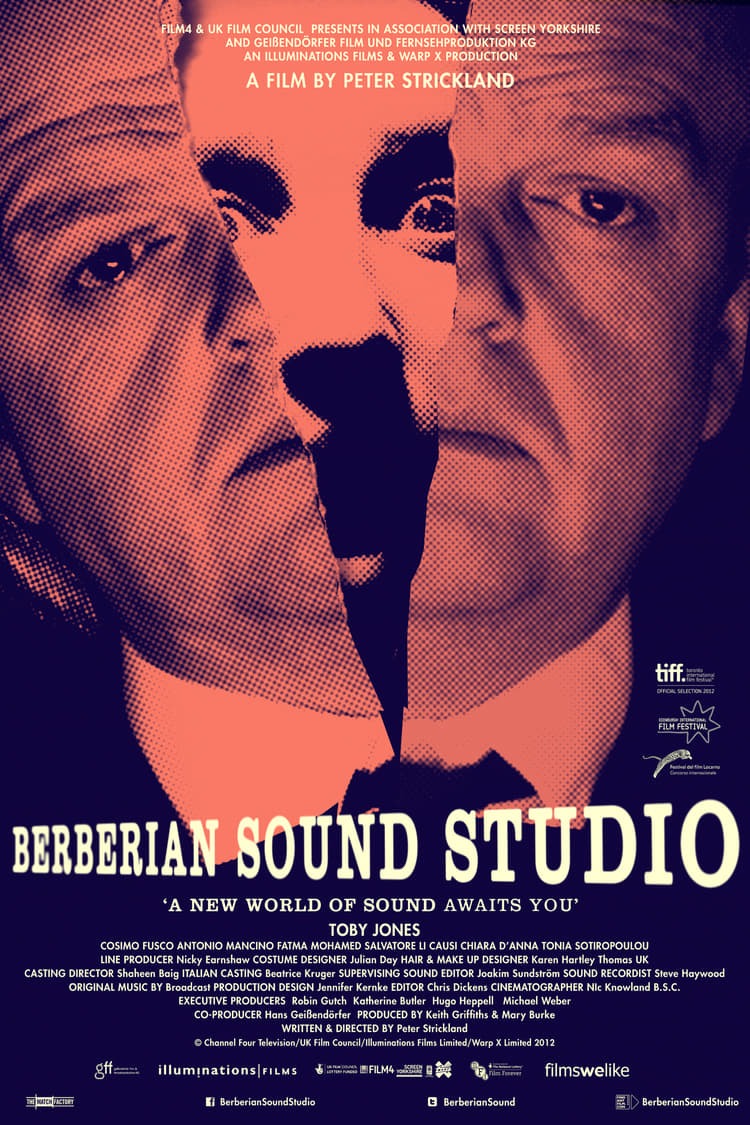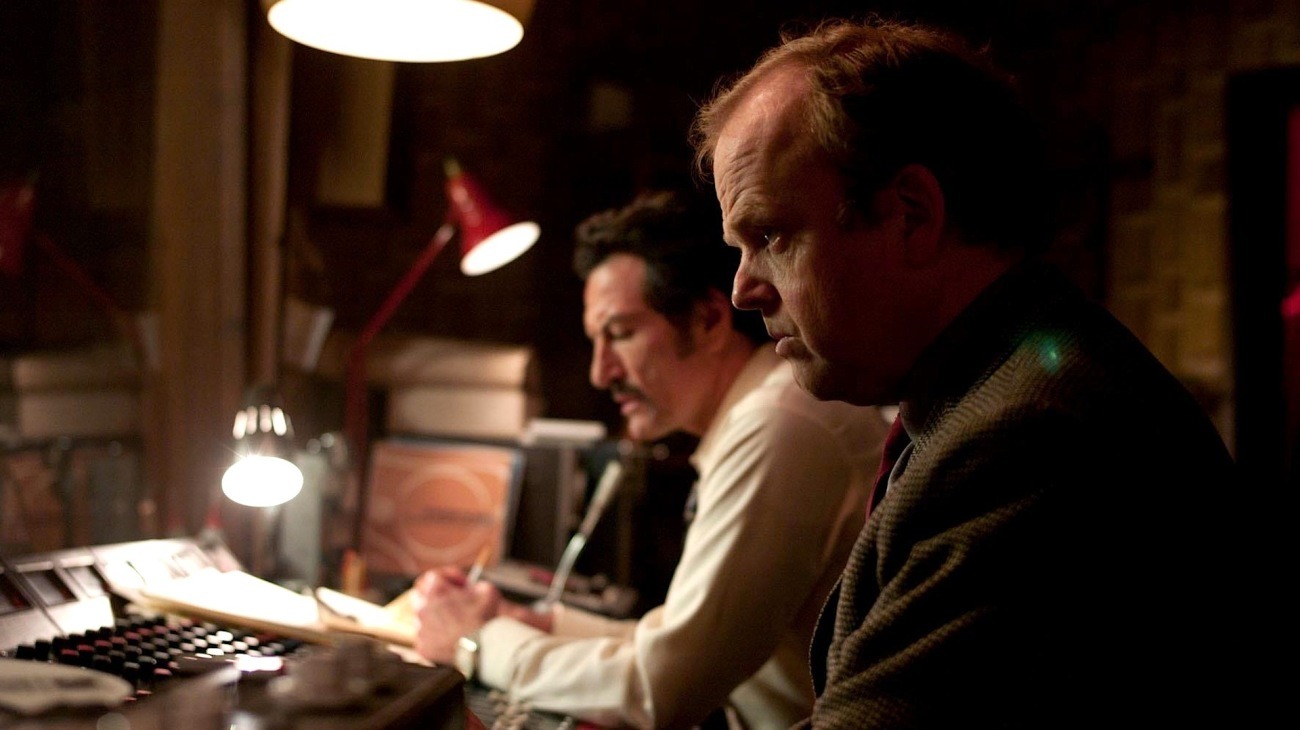
Sound and fury
Writer-director Peter Strickland's Berberian Sound Studio works, I am tempted to say, in spite of itself; it works "for all the wrong reasons" might do just as well. They key is that it works. The film is smart as hell, for one thing. It has been carefully worked out just so, with a final third that significantly up-ends what we think we've been watching in a way that at first blush seems random and ridiculous, but gels rather neatly, if you let it percolate and bear in mind what genre this belongs to. Which is a genre that the film itself seems to have invented, for it's basically a combination of the British psychological thriller of the 1960s and the Italian post-giallo paranormal horror film of the 1970s. And one of these things is much more eager to play "fuck you" games with the audience's desire for logic, but both tend to be what we might call subjectivity-based genres, and in the case of Berberian Sound Studio, the subjective viewpoint we're adopting is that of a man losing the ability to distinguish between reality and fiction; the final third of the movie might be read as the ultimate expression of his subconscious preoccupations throughout the first two-thirds, or it might be understood as the real reality which has been hiding all along, in the fashion of Mulholland Dr. Either way, it is the expression of the mind of a man who has lost his tether.
The man in question is a nervous, ultra-British fellow named Gilderoy (Toby Jones), a sound designer for motion pictures who has just been hired by Italian producer Francesco Coraggio (Cosimo Fusco) to provide the effects and mix for Il vortice equestre, a horror movie whose plot details, barely dribbled out, make it sound powerfully like Suspiria (the film doesn't come right out and say "this is the 1970s", but that seems to be a fair assumption to make). Gilderoy is not a good traveler or even an especially functional adult - he lives with his mother, we're able to discover if we're keeping an eye on the letters held up to the camera but never read, a nifty trick that invites an unusual degree of interaction between viewer and movie. And the situation he's arrived in would make even a seasoned adventurer long for the comforts of home: one of the two lead actresses is a breathy, talentless bimbo, the director, Giancarlo Santini (Antonio Mancini) is a self-adoring auteurist whose vision for the movie is implicitly at direct odds with Coraggio's, and the very unfriendly company secretary, Elena (Tonia Sotiropoulou) is stonewalling his attempts to get reimbursed for his travel expenses, effectively stranding him in this hostile environment. And, of course, he doesn't speak more than rudimentary traveler's Italian, which isn't just a personal liability, but a professional one as well.
The film's most captivating strength and its Achilles's heel are one and the same, but let me not reveal it just yet. First, let's take a look at what this is, for Berberian Sound Studio is a film of many layers and metanarratives. To begin with, there's the matter of Il vortice equestre - The Equestrian Vortex, misunderstood as a film about horses by the country-loving Gilderoy - of which we see not a single frame, except for the opening credits; and these occur at precisely the point that you'd expect to see Berberian Sound Studio's own credits (and with as little connection to the diegesis: nobody is watching them, that we can tell, except for us). It's obvious enough that we're being invited to conflate the movie and the movie-within-the-movie. And since the bulk of the first hour consists of watching Gilderoy provide sound effects to unseen horrors that are verbally described, or detailed on his grand flow chart, what we get to do a lot of is listen to Il vortice equestre. In fact, solely through audio cues, we end up learning a lot more about what happens in Santini's film than in Strickland's, at the level of "plot".
To a great extent, Berberian Sound Studio is an experiment of sorts, exploring how much meaning we, the outermost level of audience, can extract from nothing but sound, augmented by watching the expressions of people watching the thing we're hearing (Gilderoy, to nobody's surprise in the audience and everybody's in the movie, has a weak stomach for gory horror). It's not exactly a film "about sound", but it's a film about how we piece together meaning in cinema.At all points, we're watching Berberian Sound Studio but also interpreting Il vortice equestre, until the the final third comes along, collides the two films in irresolvable ways, and having then done its job of demonstrating how little value there is in looking for "meaning in cinema" anyway, destroys itself as viscerally as any film this side of Persona.
So that's the captivating part. The problem - and maybe the fact that I'm calling it a problem reveals personal bias, but I don't think so - is that it's sluggishly intellectual, operating entirely at the level of thinking and not at the level of feeling. But, in keeping with the phantasmagoric Italian films it's both paying tribute to and parodying (the film is bleakly funny at times, far funnier than I'd have ever predicted), much of what "happens" at the film is so subjective and impressionistic that it can only be understood at the level of feeling: having yoked its perspective firmly to Gilderoy's, the film can thus break itself down as a means of dramatising his own loosening grip on reality. So we have a film that at one and the same time can only be understood as a detached, highly intellectualised experience that isn't a tiny bit scary, and a film that's only satisfying if we give in and just experience the thing as a disorienting ride through fragmenting psychology. Either way, that leaves a lot of nonsensical bullshit lying around, and it's really not possible, that I can tell, to resolve the film's disparate parts in any kind of coherent way. The result is a dazzling mess full of terrific visuals (the repeated use of a blood-red "SILENZIO" sign is the best horror movie image of the year), entrancingly confounding audio, and a lot of random tedium interspersed in between. I'm tempted to call it required viewing, doubly so for fans of Italian horror, but certainly not because it is objectively great, or even because it is, for the most part, very good. But the parts can be awfully good, and the whole is different - not more, just different - than the sum of its parts.
The man in question is a nervous, ultra-British fellow named Gilderoy (Toby Jones), a sound designer for motion pictures who has just been hired by Italian producer Francesco Coraggio (Cosimo Fusco) to provide the effects and mix for Il vortice equestre, a horror movie whose plot details, barely dribbled out, make it sound powerfully like Suspiria (the film doesn't come right out and say "this is the 1970s", but that seems to be a fair assumption to make). Gilderoy is not a good traveler or even an especially functional adult - he lives with his mother, we're able to discover if we're keeping an eye on the letters held up to the camera but never read, a nifty trick that invites an unusual degree of interaction between viewer and movie. And the situation he's arrived in would make even a seasoned adventurer long for the comforts of home: one of the two lead actresses is a breathy, talentless bimbo, the director, Giancarlo Santini (Antonio Mancini) is a self-adoring auteurist whose vision for the movie is implicitly at direct odds with Coraggio's, and the very unfriendly company secretary, Elena (Tonia Sotiropoulou) is stonewalling his attempts to get reimbursed for his travel expenses, effectively stranding him in this hostile environment. And, of course, he doesn't speak more than rudimentary traveler's Italian, which isn't just a personal liability, but a professional one as well.
The film's most captivating strength and its Achilles's heel are one and the same, but let me not reveal it just yet. First, let's take a look at what this is, for Berberian Sound Studio is a film of many layers and metanarratives. To begin with, there's the matter of Il vortice equestre - The Equestrian Vortex, misunderstood as a film about horses by the country-loving Gilderoy - of which we see not a single frame, except for the opening credits; and these occur at precisely the point that you'd expect to see Berberian Sound Studio's own credits (and with as little connection to the diegesis: nobody is watching them, that we can tell, except for us). It's obvious enough that we're being invited to conflate the movie and the movie-within-the-movie. And since the bulk of the first hour consists of watching Gilderoy provide sound effects to unseen horrors that are verbally described, or detailed on his grand flow chart, what we get to do a lot of is listen to Il vortice equestre. In fact, solely through audio cues, we end up learning a lot more about what happens in Santini's film than in Strickland's, at the level of "plot".
To a great extent, Berberian Sound Studio is an experiment of sorts, exploring how much meaning we, the outermost level of audience, can extract from nothing but sound, augmented by watching the expressions of people watching the thing we're hearing (Gilderoy, to nobody's surprise in the audience and everybody's in the movie, has a weak stomach for gory horror). It's not exactly a film "about sound", but it's a film about how we piece together meaning in cinema.At all points, we're watching Berberian Sound Studio but also interpreting Il vortice equestre, until the the final third comes along, collides the two films in irresolvable ways, and having then done its job of demonstrating how little value there is in looking for "meaning in cinema" anyway, destroys itself as viscerally as any film this side of Persona.
So that's the captivating part. The problem - and maybe the fact that I'm calling it a problem reveals personal bias, but I don't think so - is that it's sluggishly intellectual, operating entirely at the level of thinking and not at the level of feeling. But, in keeping with the phantasmagoric Italian films it's both paying tribute to and parodying (the film is bleakly funny at times, far funnier than I'd have ever predicted), much of what "happens" at the film is so subjective and impressionistic that it can only be understood at the level of feeling: having yoked its perspective firmly to Gilderoy's, the film can thus break itself down as a means of dramatising his own loosening grip on reality. So we have a film that at one and the same time can only be understood as a detached, highly intellectualised experience that isn't a tiny bit scary, and a film that's only satisfying if we give in and just experience the thing as a disorienting ride through fragmenting psychology. Either way, that leaves a lot of nonsensical bullshit lying around, and it's really not possible, that I can tell, to resolve the film's disparate parts in any kind of coherent way. The result is a dazzling mess full of terrific visuals (the repeated use of a blood-red "SILENZIO" sign is the best horror movie image of the year), entrancingly confounding audio, and a lot of random tedium interspersed in between. I'm tempted to call it required viewing, doubly so for fans of Italian horror, but certainly not because it is objectively great, or even because it is, for the most part, very good. But the parts can be awfully good, and the whole is different - not more, just different - than the sum of its parts.






